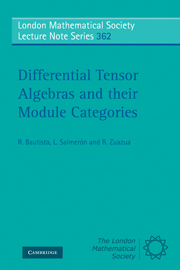Book contents
- Frontmatter
- Contents
- Preface
- 1 t-algebras and differentials
- 2 Ditalgebras and modules
- 3 Bocses, ditalgebras and modules
- 4 Layered ditalgebras
- 5 Triangular ditalgebras
- 6 Exact structures in A-Mod
- 7 Almost split conflations in A-Mod
- 8 Quotient ditalgebras
- 9 Frames and Roiter ditalgebras
- 10 Product of ditalgebras
- 11 Hom-tensor relations and dual basis
- 12 Admissible modules
- 13 Complete admissible modules
- 14 Bimodule filtrations and triangular admissible modules
- 15 Free bimodule filtrations and free ditalgebras
- 16 AX is a Roiter ditalgebra, for suitable X
- 17 Examples and applications
- 18 The exact categories P(∧), P1(∧) and ∧-Mod
- 19 Passage from ditalgebras to finite-dimensional algebras
- 20 Scalar extension and ditalgebras
- 21 Bimodules
- 22 Parametrizing bimodules and wildness
- 23 Nested and seminested ditalgebras
- 24 Critical ditalgebras
- 25 Reduction functors
- 26 Modules over non-wild ditalgebras
- 27 Tameness and wildness
- 28 Modules over non-wild ditalgebras revisited
- 29 Modules over non-wild algebras
- 30 Absolute wildness
- 31 Generic modules and tameness
- 32 Almost split sequences and tameness
- 33 Varieties of modules over ditalgebras
- 34 Ditalgebras of partially ordered sets
- 35 Further examples of wild ditalgebras
- 36 Answers to selected exercises
- References
- Index
Preface
Published online by Cambridge University Press: 07 September 2011
- Frontmatter
- Contents
- Preface
- 1 t-algebras and differentials
- 2 Ditalgebras and modules
- 3 Bocses, ditalgebras and modules
- 4 Layered ditalgebras
- 5 Triangular ditalgebras
- 6 Exact structures in A-Mod
- 7 Almost split conflations in A-Mod
- 8 Quotient ditalgebras
- 9 Frames and Roiter ditalgebras
- 10 Product of ditalgebras
- 11 Hom-tensor relations and dual basis
- 12 Admissible modules
- 13 Complete admissible modules
- 14 Bimodule filtrations and triangular admissible modules
- 15 Free bimodule filtrations and free ditalgebras
- 16 AX is a Roiter ditalgebra, for suitable X
- 17 Examples and applications
- 18 The exact categories P(∧), P1(∧) and ∧-Mod
- 19 Passage from ditalgebras to finite-dimensional algebras
- 20 Scalar extension and ditalgebras
- 21 Bimodules
- 22 Parametrizing bimodules and wildness
- 23 Nested and seminested ditalgebras
- 24 Critical ditalgebras
- 25 Reduction functors
- 26 Modules over non-wild ditalgebras
- 27 Tameness and wildness
- 28 Modules over non-wild ditalgebras revisited
- 29 Modules over non-wild algebras
- 30 Absolute wildness
- 31 Generic modules and tameness
- 32 Almost split sequences and tameness
- 33 Varieties of modules over ditalgebras
- 34 Ditalgebras of partially ordered sets
- 35 Further examples of wild ditalgebras
- 36 Answers to selected exercises
- References
- Index
Summary
This monograph is concerned with the notions of ditalgebras (an acronym for “differential tensor algebras”) and the study of their categories of modules. It involves reduction techniques which have proved to be very useful in the development of the theory of representation of finite-dimensional algebras. Our aim has been to present in a systematic, elementary and self-contained as possible way some of the main results obtained with these methods. They were originally introduced by the Kiev School in representation theory of algebras, in an attempt to formalize and generalize matrix problems methods.
The presentation given here has many common features with the original one of A. V. Roiter and M. Kleiner [46], in terms of differential graded categories, as well as with the formulation given by Y. Drozd [28] (and further developed by W. Crawley-Boevey [19] and [20]), in terms of bocses. It is clear that some applications of these techniques, notably in the study of coverings in representation theory of algebras, will require the categorical formulation of the theory, as suggested in [30]. However, for the sake of simplicity, we preferred to work here in the more concrete ring theoretical context of ditalgebras. We assume from the reader some familiarity with the basics of representation theory of algebras and homological algebra (including the basics of the theory of additive categories with exact structures), which can be obtained from the first sections of [29], [47] and [3] (respectively, [32] and [27]).
- Type
- Chapter
- Information
- Differential Tensor Algebras and their Module Categories , pp. vii - xPublisher: Cambridge University PressPrint publication year: 2009

